Muslims believe that Allah is the Creator of life which is a gift from Him. We consider all life to be sacred
and it must be protected. Hence, Muslims in particular and all empathetic people in general are expected to contribute in saving life
and contributing towards the well-being of the people in whichever way possible. Islam considers access to health care a fundamental
right of every individual. One of the main principles of Islamic medical ethics is an emphasis on the sanctity of human life which is
derived from The Quran which states, “Whosoever saves a human life saves the life of the whole mankind. (5:32).
Donating blood is one of the ways of saving life. In spite of the rapid and remarkable advancements in medical science today, no
factory can manufacture blood. It is only in human beings that human blood is made and circulated. Hence, voluntary donation is the
only way of accumulating blood at safe storages to meet emergency requirements for saving lives. Moreover, the paradigm of health care
in Islam is fundamentally egalitarian in its essence. The respect & care for life is common for all humans, irrespective of gender,
age, race, color,faith, ethnic origin or financial status
Various diseases from common colds to potentially fatal ailments like Tuberculosis, Malaria etc.take a heavy toll on the human resources of our nation & the world at large. Physical illnesses significantly impact the economic, social and spiritual growth of any society, perpetuating a cycle of hunger and poverty.Those who are educationally and economically challenged often don’t have there sources to get to the hospital or to a doctor to seek treatment. Islam considers access to health care a fundamental right of every individual. One of the main principles of Islamic medical ethics is an emphasis on the sanctity of human life which is derived from The Quran which states, “Whosoever saves a human life saves the life of the whole mankind.(5:32) Protection & preservation of life as well as healthcare for all are among the fundamental principles of the prophetic tradition. All patients irrespective of their faith should be treated with human dignity, respect &loving care as if they are members of our own family.
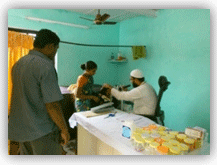
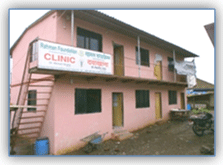
Rahman Foundation Primary Health Care Centre atDamat, in Karjat Taluka, Raigadh Dist, Maharashtra
To bring this profound belief to life, Rahman Foundation has established 3 primary health care centers, one in Lucknow and one each in Mamdapur and Damat which are remote villages in Maharashtra state.These public healthcare clinics function as medical & therapeutic centers to treat the local population of common ailments by providing them access to basic medication.
Donating blood is one of the most important, selfless, and humanitarian acts that a person can perform.Blood is vital to human life. Timely access to safe blood transfusion is a life-saving measure in many clinical conditions in patients suffering from injuries due to violence or accidents, child birth related complications and other ailments.
Since blood cannot be stored forever - it has a shelf life of around 40 days, there is a constant demand for blood. Against an average current annual requirement of 8 million units of blood, only 5.6 million units of blood are collected in our country. To partially fulfill this acute shortfall, in its own minor way, Rahman foundation conducts blood donation camps and its volunteers actively participate in blood donation programs.
The Foundation with the will & blessings of Allah also attempts to educate and create awareness among the local people emergency-aid preventive healthcare approaches with respect to personal hygiene, balanced dietary measures and the avoidance of addictive habits which are especially rampant in the economically deprived strata of our society.
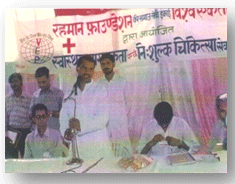
Hon’blestate health minister of U.P. Mr. Ramapati Shastri addressing the people at afree medical camp organized by Rahman Foundation
The guidance for the spirit and manner of service to mankind has been completed in the form of a perfect organized system established
by our beloved Prophet Hazrat Muhammad (S.A). Therefore the assistance of the poor, taking care of the orphans and widows, and
helping the prisoners and wayfarers, in the form of Zakat has been declared a pillar equally important to Salah.
Zakat has been pronounced as a collective deed like Salah. A connection with Allah has been associated with Salah in congregation.
Likewise a connection with Allah is also realized by establishing a good social system based on the collective system of Zakat
committed to human welfare.
Today we have a substantial number of people who offer Salah in congregation but unfortunately the collective system of Zakat has
faded away almost completely. This situation has resulted into the following drawbacks:
Millions of men, women, and children are living below the poverty line. Countless widows, divorced women and orphans are left without
any patron. Numerous handicapped and elderly people are rendered helpless. Thousands of poor patients with critical ailments are
deprived of medical treatment.
These affected people are compelled to barter their character, integrity, and faith for their needs. The Prophet (S.A) has rightly
said, “Poverty leads to denunciation of faith.”
Another major disadvantage is that we no longer have any system for those who want to discard the path of evil and transform
themselves into good human beings.
Lastly, catastrophic attempts are being made to fill this void by persons/organizations with no knowledge of the Quran and
Sunnah. As a consequence, these people have started collecting Zakat in the name of the collective Zakat system and instead of
spending it under the guidance of the Quran and Sunnah they spend it as per their desire.
The concept of zakat exemplifies Islam's strong concern with social and economic justice. It serves as the most effective system of equitable redistribution of wealth and income in society. It is a moral obligation as well as an effective fiscal measure for poverty eradication. However, the distributive economic impact of zakat depends on how it is administered, especially with regard to its distribution. Unfortunately, the administration of zakat in our society is not adequate, and therefore the full potential of zakat has not yet been realized in the contemporary circumstances. The critical responsibility of the collective Zakat system should therefore be shouldered by those who possess the true knowledge of the Quran and Sunnah and those who are trained and tested by the prominent spiritual and scholarly figures. The Rahman Foundation with the blessing of our esteemed scholars, divine will & help has made an attempt to revive the comprehensive economic miracle of the system of zakat by spreading its benefits to cater to the needs of all the deserving domains of society.
There are hundreds of verses in the Quran that exhort believers to reflect on nature & orders us to pay heed to them as a sign and a
warning - the sky, the stars, the moon, the sun, the seed, the rain, the oceans and the mountains are all mentioned repeatedly and
we are asked to understand the signs that are in them. But how can we appreciate these signs if we are carelessly defiling our own
surroundings? Along with acknowledging the signs in nature, Islam also considers appropriate sanitation to be one of the fundamentals
of belief.
The whole earth has been created a place of worship, pure and clean. Hence, civic sanitation & conservation is a commandment from Allah.
Throughout the ages cleanliness was one of the most striking characteristics of the Islamic Civilization. Islam’s care & respect for
the environment and fellow living beings is amply borne out by the fact that even clearing an obstacle from people’s path is also
considered charity. As representatives/stewards of Allah on earth, Muslims are instructed to look after the environment instead of
presiding over its destruction. It is the religious responsibility of Muslims to have proper civic sense, be hygienic & care for all
forms of life created by the Almighty.
The Earth is a sanctuary Allah made for our benefit and productive use. According to Islamic injunctions afforestation is highly
encouraged. If a person plants a tree or sows a field and humans, beasts & birds eat from it, he is rewarded for it. So much so that
the Prophet decreed, “Even when the doomsday comes & if someone has a palm shoot in his hand, he should plant it”.
Moreover Islam also forbids us to waste water, food or spend of our wealth on unnecessary things. The Quran says, “But waste not by
excess: for Allah loveth not the wasters” (6:141). Each one of us will be responsible for wasteful behavior and we will be held
accountable for it. The Prophet directed us not to waste while performing ablution even if we are using water from a flowing river.
Therefore Islam's aversion to waste & concern for the depletion of natural resources is not simply instrumental, but fundamental.
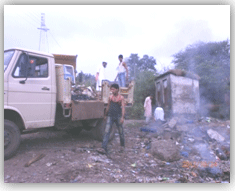
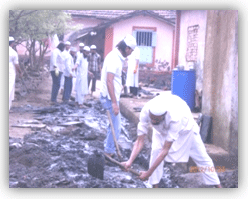
Volunteers of Rahman Foundation on a civic sanitation drive at Damatvillage, Maharashtra
As Allah’s trustees on earth human beings are responsible for protecting & maintaining the purity of the Earth’s vast oceans, forests, mountains as well as its flora & fauna, its wildlife and the fragile equilibrium in the environment. It is our duty to preserve the biodiversity in nature & tackle the ecological problems that besiege our planet. In an earnest attempt to be sincerely thankful to Allah for all the bounties that He has blessed us with, the Rahman Foundation periodically conducts cleanliness drives & promotes a sense of public hygiene in the neighbouring localities.
In these times of pervasive conflicts of every kind as well as rising numbers of natural disasters with unprecedented levels of
destruction and casualties, the victims invariably are the common masses. In such dire circumstances, it is imperative that some
members of the civil society commit themselves to deliver emergency relief by providing life’s basic necessities like food, healthcare
& shelter, thereby alleviating the existential predicaments of the unfortunate victims. Moreover, it is a vital social responsibility
to strive to rehabilitate the victims of civil strife or natural calamities by mobilizing resources for construction programs as well
as to provide sustainable & practical economic solutions to mitigate the impact of calamities.
The teachings of Islam dictate that in such humanitarian crises believers must strive to selflessly serve the people regardless of race,
religion, region or gender with a spirit of compassionate fellow-feeling. Every Muslim is morally obliged to earnestly respond to the
heart rendering calls of the victims & help them overcome the suffering endured due to unexpected catastrophes.
Islam is a universal message of compassion and solidarity. All Muslims are expected to voluntarily assist in relief & rescue
efforts to save victims of earthquakes and other natural disasters. It is the duty of every Muslim to extend economic aid to all
those afflicted by such tragedies. A deep sense of mutual co-operation and fellow-feeling must overwhelm every believer in such
critical times when people are devastated by disasters.
Violence and communal riots leave many orphaned, widowed, homeless & destitute. Many of the displaced people are forced to take refuge
in relief camps in cramped conditions with poor sanitary facilities. They are dependent on outside assistance to cover their elementary
needs such as food, shelter and basic medical assistance. The believers are commanded to stretch their hands with help to all those in
such dire need regardless of their faith or race.
The Rahman foundation reaches out to render the survivors of natural calamities, all forms of possible physical, financial and
psychological support. We, with the help of Allah (swt) provide emergency relief to alleviate the suffering of the victims of
communal strife and help vulnerable & traumatised people recover from their shattering ordeal.

Rahman Foundation Team at the site of devastating fires in hutments atLucknow
Supporting the poor, the widows & the orphans is a religious duty binding on all Muslims. Rehabilitation of widows & orphans is
considered to be repayment of society's debt & an expression of gratitude towards our Almighty Creator. Prophet Muhammad said: "I and
the custodian of an orphan are like this (together) in Paradise", and he joined his forefinger and middle finger together. (Bukhari)
Moreover, the Quran admonishes the negligent in no uncertain terms, “Have you seen the one who denies the Recompense? For that is the
one who drives away the orphan And does not encourage the feeding of the poor So woe to those who pray. [But] who are heedless of their
prayer - Those who make show [of their deeds] And withhold [simple] assistance. (Surah Ma’un 107:1-7)
Therefore caring for the needy is a pre-requisite for our ultimate salvation in the hereafter. Whether it is providing economic aid in
emergency situations & relief to victims of violence and natural disasters or financial support for deserving students or spiritual
succor to the psychologically distressed or helping alleviate the suffering of the elderly – it is all a moral and religious obligation
upon all Muslims.
Out of all the calamities that can befall a woman, widowhood is perhaps the worst. Islam sets out to redress her lot with a firm hand.
Widows in our society live in dire conditions with hardly any means of sustenance, with no aid to support them or their children. Many
of them are in need of funding to set up safe, sheltered & sustainable vocations like sewing, cooking etc. so as to enable them to
sustain themselves and their families.
If the civil society doesn’t come forward to alleviate their agonies, they often fall victims to the nefarious intentions of the
ruffians & anti-social elements of the decadent contemporary society. Our beloved Prophet said, “He who looks after a widow and a
needy person is like the one who strives for the cause of Allah or like a person who fasts during the day and prays all night (Bukhari)”.
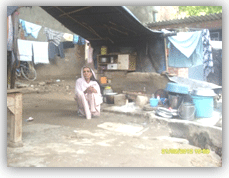
A beneficiary Ms.Shahidunnisa
Rahman Foundation provides a monthly pension to the needy and the elderly widows for their livelihood. It seeks to ameliorate their economic woes & emotional anguish by providing them with monetary aid as well as tacit psychosomatic counseling
The mind boggling statistics of deprivation & afflictions in the contemporary world are heart rendering indeed.
More than 140 million children are orphans across the globe.
More than 1 billion people around the world are living in hunger.
More than 1 billion people around the world do not have access to clean drinking water.
More than 2 billion people worldwide do not have basic sanitation or medical facilities.
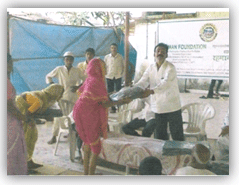
Blankets being distributed in the winter by Mr. Pullik Shinare, Sarpanch of Mamdapur at Khanqah NaqshbandiaMujaddidia, Mamdapur, Neral
It is the obligation of every believer to contribute to the upliftment of the marginalized & deprived members of our society.
The Messenger of Allah (pbuh), said: "He who does not have mercy upon people, Allah's mercy will be kept from him." Anyone upon
whom Allah bestowed His grace and who sees another brother in humanity - hungry, in need of clothes and miserable, and still does
not help him, he will indeed, deprive himself of Allah's mercy. However, our beloved Prophet also proclaimed that, “Charity puts
out sins as water puts out fire.”
Rahman Foundation with the grace of Allah (swt) provides economic assistance to the underprivileged to meet their various needs
ranging from supporting the marriage of poor girls to providing sustenance & shelter to the deprived members of our society.
The history of our civilization is replete with incredible instances of the journey of scholarship of illustrious luminaries
across racial, regional & financial barriers. Education throughout our rich history was a domain largely unfettered with the
restrictions of pecuniary demands.
Rahman Foundation has made a humble attempt to revive this non-discriminatory legacy in this age of rampant commodification of
education. The foundation supports poor meritorious students by awarding them scholarships to pursue higher studies.